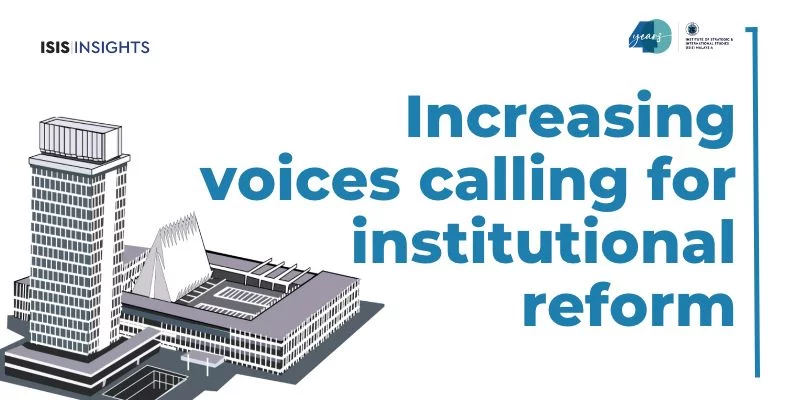Unity govt must deliver its promises to ensure country’s good governance
THE calls for institutional reform are becoming louder each day since the 15th general election (GE15). Among those who have spoken up are Law Minister Datuk Seri Azalina Othman (December 2022), Bersih (December 2022), former International Reforms Committee (IRC) member Ambiga Sreenevasan (January 2023), Senate Speaker Tan Sri Rais Yatim (January 2023), G25 members and former DAP leader Lim Kit Siang (January 2023).
All of these voices reminded the current Anwar administration to take up the promises of institutional reform made in 2018 which have yet to be undertaken. Following Pakatan Harapan’s victory in May 2018, the IRC was set up and headed by the late Datuk K. C. Vohrah with five other prominent Malaysians. The committee submitted its report in July 2018.
However, the report has not been released despite there being an extensive public consultation in early 2018, and the majority of its recommendations have not been implemented.
Back in 2018, I too was among civil society leaders who made an appearance before the IRC. One of our key calls then was to withdraw the National Human Rights Action Plan (2018) and formulate a new one under the Human Rights Commission of Malaysia’s (Suhakam) leadership.
Government’s initiatives for reform
It was at the Suhakam Human Rights Day program on December 12, 2022 that the law minister announced the setting up of a special task force on institutional reform. The Prime Minister’s Department (Law and Institutional Reform) then on January 17, 2023 hosted a workshop on institutional reform where both civil servants and civil society met to deliberate on the agenda.
There were five working groups namely parliamentary reform, judicial appointments, strengthening integrity and governance, human rights and justice in the criminal system. The ministry officials noted the comments made by both the civil service and civil society officials.
A follow-up event is to be hosted soon.
Parliamentary initiatives for institutional reform
When Parliament started a series of public lectures and at its opening on January 27, 2023, Senate speaker Tan Sri Rais Yatim spoke of the proposed parliamentary reform, especially on the independence of Parliament.
He highlighted the need for the reintroduction of the 1963 Parliamentary Service Act with some changes. To further empower Parliament, he highlighted the need for a review of the 1952 Privileges and Powers Act as well as the introduction of a political financing bill.
Rais also spoke of a number of new proposals including a training institute for MPs, similar to the National Institute of Public Administration. The Senate speaker emphasised the separation of powers between the legislature and executive as being essential for an effective and independent Parliament.
Fairness and justice to MPs
There have been calls for fairness in the allocation of constituency funds to all MPs irrespective of their party affiliations. As elected public officials they have a public duty and the provision of their office, staff and funding must be non-discriminatory.
Recent calls
Four key themes emerge from the recent calls in the public arena.
First, a call made by Bersih in December 2022 for the empowerment of Parliament. One of Bersih’s recommendations is on the parliamentary special select committee (PSSC) whereby each ministerial portfolio must have a PSSC and a composition of MPs without any executive position in order to undertake the check-and-balance task.
Second, Ambiga and G25’s appeal for the release of the 2018 IRC report for public review and study.
Third, Lim Kit Siang’s demand for the tabling of a white paper to renew the discussion of the various 2018 reports in Parliament.
Fourth, Ambiga’s plea for the return of local government elections. She also repeated the calls for a review of the Athi Nahappan Royal Commission Report (1968) on local government elections.
Institutional reform for grassroots democracy is centred on the return of local government elections. Likewise, it will enable MPs to focus on policy matters and local councillors to address local neighbourhood concerns.
With the political changes since GE15, there is a need for the federal government to revive the institutional reform agenda. There must be a review of all the earlier work undertaken by various appointed committees and commissions toward greater openness of their findings.
We must capture the moment to ensure lasting changes in our systems in order to ensure justice, fairness and inclusion for all.
This would practically implement the Madani principles in terms of compliance for good governance.
The federal government must institute public discussions with ample opportunities for all to participate. This could be undertaken through special select committees set up by Parliament to facilitate public participation.
This article first appeared on The Vibes on 30 January 2023





